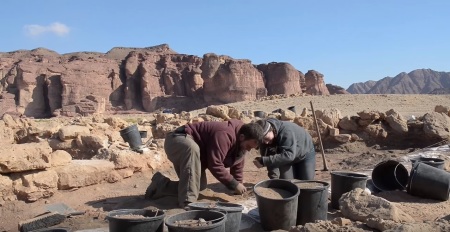Archaeology discovery: Evidence of biblical kingdom of Edom found

Researchers have discovered evidence of the emergence of the biblical kingdom of Edom, which was previously considered more mythical than historical by secular scholars.
Researchers from the University of California and the Central Timna Valley Project at Tel Aviv University documented their work in a paper published last week, titled “Ancient technology and punctuated change: Detecting the emergence of the Edomite Kingdom in the Southern Levant.”
Published by the journal PLOS One, the paper detailed how the archaeologists examined technological development in the Arabah Valley, also known as Arava Valley, located in southern Israel, specifically the process of developing copper in the Ancient Near East.
According to the researchers, there was a technological leap in copper development at a site known as “Slaves’ Hill” which was connected to the emergence of the Edomite Kingdom.
“Based on the results, we suggest punctuated equilibrium provides an innovative theoretical model for exploring ancient technological changes in relation to larger sociopolitical conditions—in the case at hand the emergence of biblical Edom–, exemplifying its potential for more general cross-cultural applications,” the abstract states.
The paper adds that the findings “shed light” on “the formation of the tribal confederation of the Edomite Kingdom.”
“While the biblical narrative describes an early, pre-10th century BCE kingdom … the archaeological record has been subjected to conflicting interpretations, even after the publication of the new chronology that clearly demonstrates the flourishing of the region during the 12th– 11th centuries BCE,” the researchers explained.
“Here, the striking synchronous agreement between the technology in Timna and Faynan, evident as early as the 11th century BCE … suggests that an overarching political body existed in the region already at this time.”
Tel Aviv University professor Erez Ben-Yosef, the lead author of the study and director of the Central Timna Valley Project, told Sky News in an interview published Tuesday that he believed his study had a broader significance in determining how humanity went from the Bronze Age to the Iron Age.
“Our study sheds new light on the emergence of the archaeologically elusive biblical kingdom of Edom, indicating that the process started much earlier than previously thought,” Ben-Yosef said.
“That said, the study's contribution goes beyond the Edomite case, as it provides significant insights on ancient technological evolution and the intricate interconnections between technology and society.”
Ben-Yosef told Sky that he believed his study showed “that the punctuated equilibrium evolutionary model is applicable to ancient technological developments, and that in turn, these developments are proxies for social processes.”
The Sunday Times notes that the discovery “flies in the face of many historians who have dismissed the idea as a myth.”
Also known as Idumeans, the Edomites are mentioned over a hundred times in the Old Testament and are said to be the descendants of Esau, twin brother of Jacob, as described in the book of Genesis.
According to the Bible, the Edomites founded a kingdom that predated the ancient kingdom of Israel and were known to be longtime enemies of the Hebrews.
“This kingdom had developed a government led by kings long before the monarchy arose in Israel,” the apologetics site GotQuestions.org explains.
“Genesis 36:31-39 lists the eight Edomite kings up to that time, delineating a long line of political leaders during the years in which Israel lived in slavery in Egypt.”





















